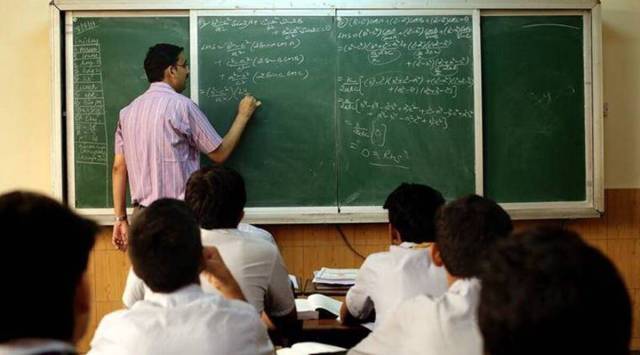Include pranayama, Sanskrit in curriculum: Suggestions for higher education in state
Other suggestions that have been floated are that on the basis of the students' performance in the first year, they should be allowed to change their major; and there should be a common syllabus for all universities.
 As per the suggestions and feedback accessed by The Indian Express, a college teacher suggested that "in some universities, subjects like General English and Commercial Communication are likely to be relegated to the background. (Express Photo)
As per the suggestions and feedback accessed by The Indian Express, a college teacher suggested that "in some universities, subjects like General English and Commercial Communication are likely to be relegated to the background. (Express Photo) From the inclusion of pranayama in all undergraduate courses, mandatory teaching of Sanskrit and regional languages, to options of courses on Braille and sign languages – these are some of the suggestions received by the Gujarat Education Department from different stakeholders for the ‘Choice Based Credit Framework’ for the academic session 2023-24.
For the implementation of the National Education Policy (NEP) 2020 in higher education in the state, the Education Department sought suggestions and feedback on the draft proposal that was put out in the public domain. A majority of the feedback was received from the teaching staff of colleges and universities across Gujarat.
As per the suggestions and feedback accessed by The Indian Express, a college teacher suggested that “in some universities, subjects like General English and Commercial Communication are likely to be relegated to the background. If these subjects are not taught compulsorily at least in the initial four semesters, it will adversely affect the employability of our students in the global market”.
Another suggestion contradicted the viewpoint, saying, “In addition to English, Indian languages should also be included (in the curriculum).”
In view of the inputs, the Education Department is in the process of finalising the ‘Choice Based Credit Framework’ for the academic session 2023-24 and its Standard Operating Procedures (SOPs), which would be applicable to all educational institutes. A senior education official said, “It will be considered in the SOPs. In some cases, it depends on students’ preferences — for instance, in cases of new courses or subjects. In other matters, separate arrangements could be made. For instance, it has been suggested to create awareness towards NEP 2020 among teachers, parents, and students.”
The curriculum and credit framework for undergraduate programmes will be applicable to BA, BSc, BCom, and all non-AICTE (All India Council for Technical Education) professional, and U-G degree programmes, and also to MA, MSc, MCom, and all non-AICTE professional PG degree programmes.
There is even a suggestion for a reduction of the percentage for research work and dissertations from 75 to 55 “because students in B Com are not affluent and capable of scoring 75 per cent in most colleges in South Gujarat and backward areas”.
Suggestions to prepare a credit framework for hearing impaired students as per their requirement as well as to keep Braille and sign language courses as options for students are among others that have been received.
“Every day, a minimum of half-an-hour pranayama practice should be made mandatory for all students till undergraduate courses”; “in all streams, Sanskrit grammar should be taught mandatorily”, “employment-related courses should be added keeping in mind the global market demands” – are other recommendations.
Also, several stakeholders including college principals have appealed to the government to immediately appoint regular principals in grant-in-aid colleges, along with the appointment of teaching and non-teaching staff.
Other suggestions that have been floated are that on the basis of the students’ performance in the first year, they should be allowed to change their major; and there should be a common syllabus for all universities.







